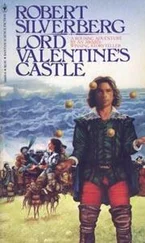But the impact had not been as strong as Faraataa had hoped. He had imagined that the blood-hungry giant miluftas would terrorize Ni-moya, which had already been in a state of chaos—but he had not expected that Lord Hissune’s army would be in Ni-moya when the miluftas reached the city, or that his archers could dispose of the deadly birds so easily.
And now Faraataa had no more miluftas, and it would take five years to breed enough to make any impact…
But there were pilligrigorms. There were gannigogs by the millions in the holding tanks, ready to be set loose. There were quexes; there were vriigs; there were zambinaxes; there were malamolas. There were new plagues: a cloud of red dust that would sweep over a city in the night and leave its water supply poisonous for weeks, and a purple spore from which came a maggot that attacked all grazing animals, and even worse. Faraataa hesitated to let some of these loose, for his scientists had told him it might not be so simple to bring them under control after the defeat of the Unchanging Ones. But if it seemed that the war would go against his people, if there appeared to be no hope—why, then, Faraataa would not hesitate to release whatever could do harm to the enemy, regardless of the consequences.
Aarisiim returned, approaching timidly.
“There is news, O King That Is.”
“From which front?”
“Both, O King.”
Faraataa stared. “Well, how bad is it?”
Aarisiim hesitated. “In the west they are destroying the pilligrigorms. They have a kind of fire that they throw from metal tubes, which melts their shells. And the enemy is advancing rapidly through the zone where we have let the pilligrigorms loose.”
“And in the east?” said Faraataa stonily.
“They have broken through the forest, and we were not able to erect the birdnet vines in time. They are searching for Ilirivoyne, so the scouts report.”
“To find the Danipiur. To make an alliance with her against us.” Faraataa’s eyes blazed. “It is bad, Aarisiim, but we are far from finished! Call Benuuiab here, and Siimii, and some of the others. We will go to Ilirivoyne ourselves, and seize the Danipiur before they can reach her. And we will put her to death, if need be, and then who will they make their alliance with? If they seek a Piurivar with the authority to govern, there will be only Faraataa, and Faraataa will not sign treaties with Unchanging Ones.”
“Seize the Danipiur?” said Aarisiim doubtfully. “Put the Danipiur to death?”
“If I must,” Faraataa said, “I will put all this world to death, before I give it back to them!”
In early afternoon they halted at a place in the eastern Rift called Prestimion Vale, which Valentine understood had once been an important farming center. His journey across tormented Zimroel had taken him through scenes of almost unrelieved grimness—abandoned farms, depopulated cities, signs of the most terrifying struggles for survival—but this Prestimion Vale was surely one of the most disheartening places of all.
Its fields were charred and blackened, its people silent, stoic, stunned. “We were growers of lusavender and rice,” said Valentine’s host, a planter named Nitikkimal, who seemed to be the district mayor. “Then came the lusavender smut, and everything died, and we had to burn the fields. And it will be two years more, at least, before it is safe to plant again. But we have remained. Not one of us from Prestimion Vale has fled, your majesty. We have little to eat—and we Ghayrogs need very little, you understand, but even we do not have enough—and there is no work for us to do, which makes us restless, and it is sad to look at the land with these ashes upon it. But it is our land, and so we stay. Will we ever plant here again, your majesty?”
“I know that you will,” said Valentine. And wondered if he were giving these people false comfort.
Nitikkimal’s house was a great manor at the head of the valley, with lofty beams of black ghannimor wood, and a roof of green slate. But it was damp and drafty within, as though the planter no longer had the heart to make repairs as they became necessary in Prestimion Vale’s rainy and humid climate.
That afternoon Valentine rested alone for a while in the huge master suite that Nitikkimal had turned over to him, before going to the municipal meeting-hall to speak with the citizens of the district. A thick packet of dispatches from the east had caught up with him here. Hissune, he learned, was deep within Metamorph country, somewhere in the vicinity of the Steiche, searching for New Velalisier, as the rebel capital was known. Valentine wondered if Hissune would have better luck than he himself had had in his quest for the wandering city of Ilirivoyne. And Divvis had assembled a second and even greater army to raid the Piurivar lands from the other side. The thought of a warlike man like Divvis in those jungles troubled Valentine. This is not what I had intended, he thought—sending armies marching into Piurifayne. This was what I had hoped to avoid. But of course it had become unavoidable, he knew. And the times called for Divvises and Hissunes, not for Valentines: he would play his proper role, and they would play theirs, and—the Divine willing—the wounds of the world would someday begin to heal.
He looked through the other dispatches. News from Castle Mount: Stasilaine was Regent now, toiling over the routine tasks of government. Valentine pitied him. Stasilaine the splendid, Stasilaine the agile, sitting now at that desk scribbling his name on pieces of paper—how time undoes us all! Valentine thought. We who thought life on Castle Mount was all hunting and frolic, bowed now under responsibilities, holding up the poor tottering world with our backs. How far away the Castle seemed, how far away all the joys of that time when the world apparently governed itself, and it was springtime all the year round!
Dispatches from Tunigorn, too—moving through Zimroel not far behind Valentine, handling the day-by-day chores of relief activities: the distribution of food, the conservation of remaining resources, the burial of the dead, and all the other various anti-famine and anti-plague measures. Tunigorn the archer, Tunigorn the famous slayer of game—now did he justify, now do we all justify, Valentine thought, the ease and comfort of our playful boyhoods on the Mount!
He shoved the dispatches away. From the case in which he kept it, now, he drew forth the dragon’s tooth that the woman Millilain had so strangely put into his hand as he entered Khyntor. From his first moment of contact with it he had known that it was something more than a mere bizarre trinket, an amulet for the blindly superstitious. But it was only as the days unfolded, as he devoted time to comprehending its meaning and uses—secretly, always secretly, not letting even Carabella see what he was doing—that Valentine had come to realize what kind of thing it was that Millilain had given him.
Lightly he touched its shining surface. It was a delicate-looking thing, so thin as to be nearly translucent. But it was as hard as the hardest stone, and its tapered edges were sharp as fine-honed steel. It was cool in his hand, but yet it seemed to him there was a core of fire within it.
The music of the bells began to resound in his mind.
A solemn tolling, slow, almost funereal, and then a more rapid cascade of sound, a quickening of rhythm that swiftly became a breathless mixing of melodies, one rushing forth so hastily that it covered the last notes of the one that preceded it, and then all the melodies at once, a complex mind-baffling symphony of changes: yes, he knew that music now, understood it for what it was, the music of the water-king Maazmoorn, the creature that land dwellers knew as Lord Kinniken’s dragon, that was the mightiest of all this huge planet’s inhabitants.
Читать дальше












